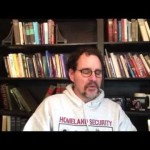We run our website the way we wished the whole internet worked: we provide high quality original content with no ads. We are funded solely by your direct support. Please consider supporting this project.
What is the significance of Ezekiel 12:1–3?
The Lord has Ezekiel symbolically enact Israel’s exile as a warning and remarks, “Perhaps they will understand, though they are a rebellious house” (vs. 3).
Though Israel repeatedly surprised God by their persistent rebellion, he nevertheless continued to hold out hope and thus to strive with them to participate in a covenant relationship with him. He thus gives Ezekiel an object lesson to carry out, hoping that “perhaps” this approach might succeed.
If everything about the future is settled and thus all future free decisions are certain to God, however, neither the “perhaps” of this verse nor the hope it is predicated on makes sense. God would have been completely certain all along that this object lesson was going to fail (because it did). Indeed, one wonders why the Lord would even waste Ezekiel’s time (while telling him he thinks it might work!) if he was absolutely certain it didn’t stand a chance.
In the open view of creation the verse is allowed to say what it seems to plainly say. God had Ezekiel go through this dramatic sermon because God genuinely thought it might work in bringing the people around to God. People are free, however, and unfortunately they sometimes used their freedom to thwart God’s plan for them.
Category: Q&A
Tags: Open Theism, Q&A
Topics: Open Theism
Verse: Ezekiel 12
Related Reading

How can I feel secure in my salvation?
Question: I constant worry about whether I’m saved or not. Do I lose my salvation every time I sin? How can I feel secure that I’m saved? Answer: It seems to me you’re framing your “salvation” within a legal paradigm rather than a relational paradigm. It’s like God is an angry judge and your a…

Why the 35W Bridge Collapsed – blog post 8/09/2007
As all of you know, I’m sure, a little over a week ago the 35W bridge in Minneapolis collapsed. This is the most traveled bridge in Minnesota. It was a tragedy, though the fact that only 13 people died and/or are presumed dead is really amazing, especially given that this happened at the peak of…

How do you respond to Daniel 2:31–45?
Daniel interprets Nebuchadnezzar’s dream to the effect that he possesses a kingdom of “gold” (vs. 38). After this there shall arise “another kingdom inferior to yours, and yet a third kingdom of bronze which shall rule over the whole earth. And there shall be a fourth kingdom, strong as iron…it shall crush and shatter all…

How do you respond to Matthew 16:21?
“From that time on, Jesus began to show his disciples that he must go to Jerusalem and undergo great suffering at the hands of the elders and chief priests and scribes, and be killed, and on the third day be raised.” The ministry and death of Jesus are the centerpieces of God’s plan in world…

Some Questions a Year After Her Child’s Death
Jessica Kelley wrote a post for The Jesus Event that we wanted to share with you. You might remember that last year we were getting to know Jessica as she lost her four year old son Henry just before Christmas. In this post, she reflects on the theology of the people around her concerning her son’s death. She has…

Free Will: How free will presupposes a great deal of determinism
This particular video was recorded last week when the forecast called for a high of -4F. Greg makes light of the freezing conditions before he settles into the topic of how a mostly determined world is actually the needed context for free will to operate. Stay warm out there!
